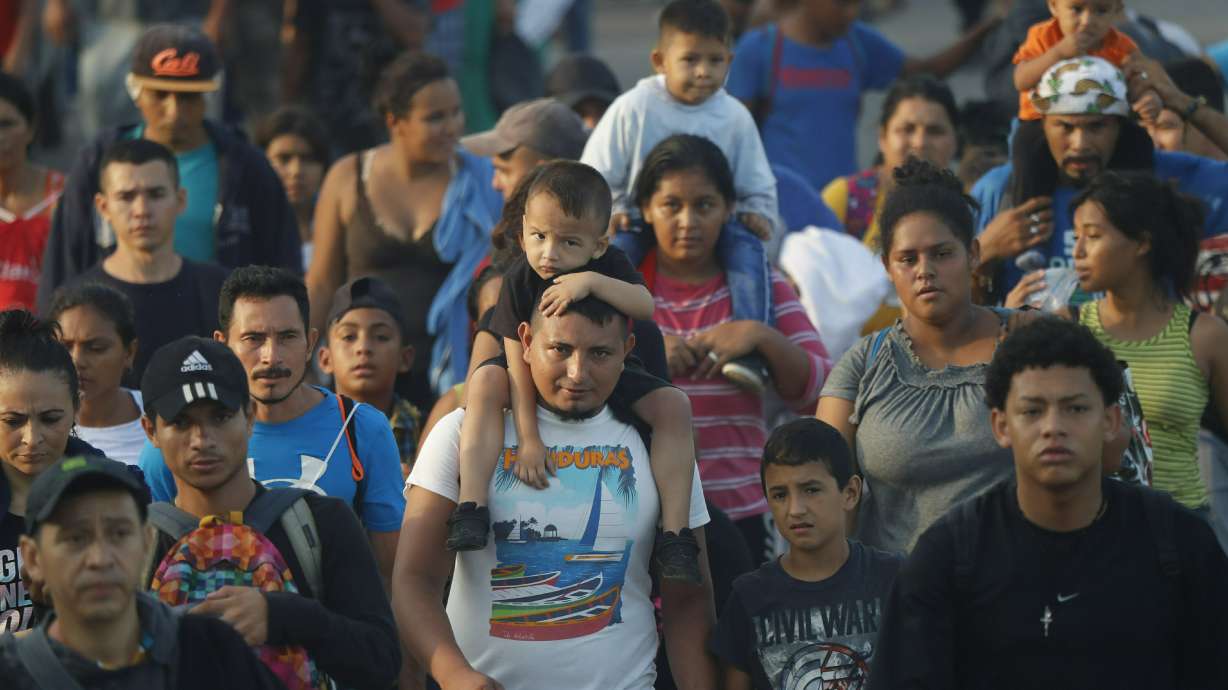Estimated read time: 3-4 minutes
This archived news story is available only for your personal, non-commercial use. Information in the story may be outdated or superseded by additional information. Reading or replaying the story in its archived form does not constitute a republication of the story.
METAPA, Mexico (AP) — Some 200 military police, immigration agents and federal police blocked the advance of about 1,000 Central American migrants who were walking north along a southern Mexico highway on Wednesday, once again showing a tougher new stance on attempts to use the country as a stepping-stone to the U.S.
The group of migrants, including many women and children, set out early from Ciudad Hidalgo at the Mexico-Guatemala border and was headed for Tapachula, the principle city in the region. State and local police accompanied the caravan.
The officials blocked the highway near the community of Metapa, about 11 miles (18 kilometers) from Tapachula.
Unarmed agents wrestled some migrants who resisted to the ground, but the vast majority complied and boarded buses or immigration agency vans. Some migrants fainted and fell to the ground. One young man who collapsed was taken for medical attention.
Some parents sat on the pavement with their children, wept and begged authorities not to take them. Others jumped wire fences and ran into the thick forest beside the highway.
The National Immigration Institute said later that about 420 migrants had agreed to be transported to a migrant detention center in Tapachula. It said they would be processed there, and if needed authorities would assist some to return to their home countries.
In recent months Mexico has used raids and roadside checkpoints to discourage highway marches such as the massive migrant caravans that occurred in 2018 and early 2019.
The migrants say they aim to reach the U.S. border, where many plan to request asylum.
The action came as Mexico's Foreign Secretary Marcelo Ebrard was in Washington to try to head off tariffs on Mexican imports threatened by U.S. President Donald Trump, who is demanding that Mexico do more to stop the passage of migrants through its territory.
Last year, migrants began travelling from Central America in large caravans that grew as they advanced through southern Mexico, drawing Trump's ire. The caravans offer migrants a relatively safe way to travel and are far less expensive than hiring smugglers.
They account for only a fraction of the normal migratory flow, but their visibility has given them an almost symbolic status in what Trump calls a migratory crisis at the U.S. border.
The first caravans were warmly received in southern Mexico towns, but as they continued, towns complained they did not have the resources to continue feeding and caring for them.
Many of the migrants say they're fleeing gang violence, oppressive extortion and corruption in Guatemala, Honduras and El Salvador. But a devastating drought is also gripping parts of the region and devastating farm families.
Mexico has responded by offering more options to stay legally on its territory, but most still have the ultimate goal of arriving in the U.S., where they can earn better pay and in many cases reunite with relatives.
__
Associated Press writer Christopher Sherman in Mexico City contributed to this report.
Copyright © The Associated Press. All rights reserved. This material may not be published, broadcast, rewritten or redistributed.









